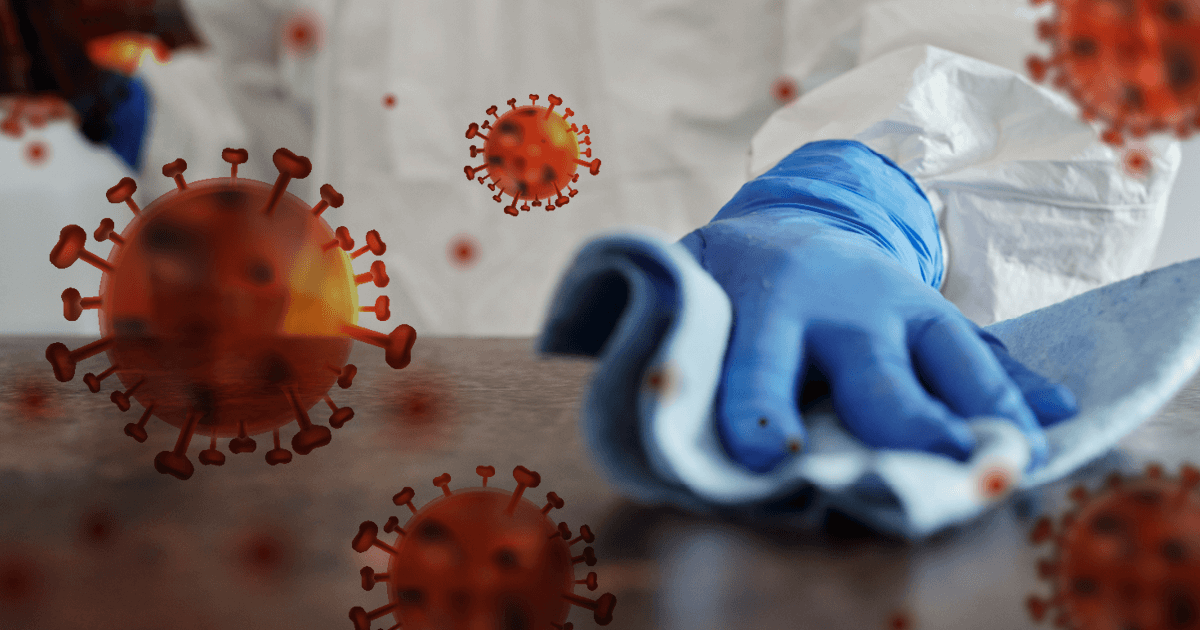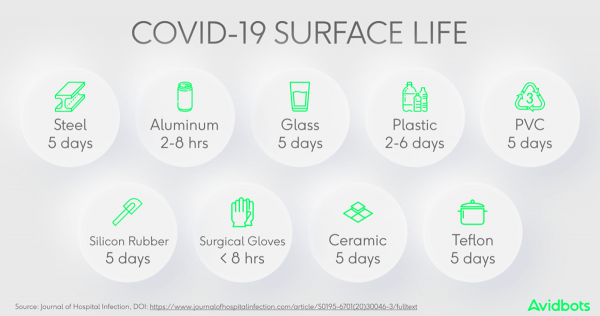
COVID-19 surface life and the importance of disinfecting
Recent studies [1 – 2] have tested how long coronavirus (COVID-19) is able to persist on inanimate surfaces in a controlled setting and their inactivation with biocidal agents. The results of these studies have shown that the aerosol and surface stability of SARS-Cov-2 (COVID-19) and its predecessor, SARS-Cov-1 (viral strain associated with the prior SARS pandemic), are similar. Researchers have found that depending on the type of material, COVID-19 can remain infectious from 2 hours up to 5 days.
Prior to reviewing the results, it’s important to understand how COVID-19 is most commonly transmitted. As outlined by the Government of Canada, COVID-19 spreads through:
-
respiratory droplets generated when you cough or sneeze
-
close, prolonged personal contact, such as touching or shaking hands
-
touching something with the virus on it, then touching your mouth, nose or eyes before washing your hands

Although COVID-19 is able to survive on a variety of surfaces for an extended period of time, the use of cleaning solutions/agents is effective in the elimination of the virus. A variety of typical cleaners work well, including hydrogen peroxide (concentration of 0.5%).
Cleaning staff around the world at facilities like hospitals, airports and retail locations have been working tirelessly in an effort to slow the spread of COVID-19. At Avidbots, we're looking to support those cleaning staff with Neo, the autonomous cleaning robot.
Regular cleaning and sanitizing of floors are important, as COVID-19 can spread from your shoes to new locations as you walk around throughout the day. Furthermore, it can spread to your hands when removing your shoes, increasing the risk of infection.
Neo's separate water tanks — one for clean water and another for dirty water — is a key feature that sets it apart from other solutions. This ensures you’re always using clean water when cleaning the floors. By adding a solution to the clean water tank, Neo cleans and sanitizes while it operates.
With Neo cleaning the floors, the janitorial staff is able to focus their time on other surfaces, including tables, chairs, light switches, door handles and other commonly used surfaces that the virus can live one.
Neo is an integral member of cleaning teams at some of the world’s leading hospitals, airports and warehouses, disinfecting the floors on a regular and consistent basis. This allows cleaning staff to focus their attention and time on other critical areas.
If you’d like to learn more about Avidbots Neo, the autonomous cleaning robot, or discuss how Neo can join your cleaning team, please contact us.
- Munster, Vincent J. (2020/03/17). Aerosol and Surface Stability of SARS-CoV-2 as Compared with SARS-CoV-1.
New England Journal of Medicine, -. doi: 10.1056/NEJMc2004973 - Kampf, G. et al. (2020/03/20). Persistence of coronaviruses on inanimate surfaces and their inactivation with a biocidal agent
Journal of Hospital Infection, Volume 104, Issue 3, 246 – 251
*Note: Always follow the cleaning and sanitizing guidelines set out by your local government, including the use and application of cleaning solutions.
Related articles
Subscribe to the Avidbots blog!
Stay in the know about all things Avidbots plus the latest industry and technology insights.